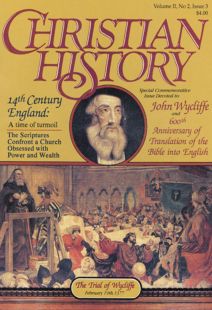John Wycliffe: From the Publisher
The year 1983 was designated the “Year of the Bible.” John Wycliffe died on New Year’s Eve in 1384. So 1984 was set for the 600th anniversary observance of his translation of the Bible into English.
Wycliffe has been heralded as “the Morningstar of the Reformation”, yet much of his life and works remain virtually unknown. Indeed, many of his 200 books have never been translated into English, inasmuch as he wrote his main works in Latin. He remains one of those many still largely undiscovered treasures of our Christian heritage.
Over 100 years ago, in 1881, Professor Montagu Burrows gave a series of lectures at Oxford, published under the title Wyclif’s Place in History, in which he pleaded for a proper recognition of Wycliffe’s place in British and Western history. He commented:
“To Wyclif we owe more than to any one person who can be mentioned, our English language, our English Bible, and our reformed religion. How easily the words slip from the tongue! But, is not this almost the very atmosphere we breathe? Expand that three-fold claim a little further. It means nothing less than this: that in Wyclif we have the acknowledged father of English prose, the first translator of the whole Bible into the language of the English people, the first disseminator of that Bible amongst all classes, the foremost intellect of his times brought to bear upon the religious questions of the day, the patient and courageous writer of innumerable tracts and books, not for one, but for all the different classes of society, the sagacious originator of that whole system of ecclesiastical reformation, which in its separate parts had been faintly shadowed forth by a genius here and there, but which had acquired consistency in the hands of the master… Wyclif founded no colleges, for he had no means; no human fabric enshrines his ideas; no great institution bears his name. The country for which he lived and died is only beginning to wake up to a sense of the debt it owes his memory. And yet so vast is that debt, so overpowering the claim, even when thus briefly summarized, that it might be thought no very extravagant recognition if every town in England had a monument to his memory.”
We urge that this issue of our magazine be used in connection with the viewing of the film JOHN WYCLIFFE: THE MORNINGSTAR and we hope that both will help to arouse new interest in a Christian leader from whom we can learn so much.
This is the third issue of Christian History magazine. We have been encouraged by the hearty response which we have received from readers.
By the Editors
[Christian History originally published this article in Christian History Issue #3 in 1983]
Next articles
Wycliffe’s England: A Time of Turmoil
England was in a time of transition during Wycliffe's lifetime.
the EditorsArchives: Five Bulls of Pope Gregory XI Against Wycliffe
Pope Gregory XI condemned Wycliffe five times.
Pope Gregory XISupport us
Christian History Institute (CHI) is a non-profit Pennsylvania corporation founded in 1982. Your donations support the continuation of this ministry
Donate



